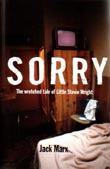|
|

Jack Marx LOW MARX Stevie Wright fronted the Australian band The Easybeats, in the mid- to late sixties. They are best remembered for their classic Friday On My Mind, since covered by Bowie on Pinup and by a million Friday night bar bands around the globe. The Easybeats also churned out dozens of other great tunes that also seem to have lasted the test of time - Sorry, I'll Make You Happy, She's So Fine, Wedding Ring and Good Times are perhaps the best known of these. The superbly packaged double album Absolute Anthology 1965 to 1969, features a fold out sleeve depicting a collage of gig posters from the time that shows the band, at the height of their fame, receiving equal billing with bands such as The Who, The Troggs, The Hollies, The Pretty Things, The Move, The Byrds, Joe Cocker and The Bonzos - in other words, the band were about as big as anyone in their heyday. Wright also enjoyed brief solo success in the mid seventies before finally disappearing from view. The fact that Stevie Wright ended up a pathetic junkie non-entity does then seem to make his rise and subsequent decline a story worth telling. Problem is, Jack Marx appears to be the wrong man to do the storytelling. He comes across as a self serving hypocrite. He paints a portrait of Wright as a very sad case, detailing the frequency with which the drug addled Wright vomits over himself and all those around him before passing out; how he continues to try increasingly transparent ways to con the author out of cash; and, most tellingly, how badly his memory has been affected by decades of hard drug indulgence. The hypocrisy comes through clearly in the description of Marx's own behaviour - on one hand he tries to get the reader to see Wright's excesses and indulgences in a negative light but yet he describes himself getting so heroically drunk that he can't remember whether or not he has raped a woman the night before. He belittles Wright for his addictions, yet champions the casual way he himself will shoot up with the singer in an attempt to get closer to his subject and unlock his tale. He gets angry at the constant attacks the singer and his de facto make upon his bank balance in order to maintain their drug supply, yet has no qualms about obtaining cash from his own mother - ostensibly to further fund his research, his 'work' - to keep the Wright household, of which he is at the time a temporary member, blissfully 'out of it'. The 'biography', in fact, is more like an autobiography of Marx. His 'wannabe' rock star dreams are lived out smugly and vicariously against the background of Wright's downfall. We get long passages detailing his periods of escape away from the depressing clutches of his subject and very little hard detail on Wright and his story at all. He brags of his own self control - he only shoots up on the odd occasion, he drinks hard and drives with skill even at high speed and when alcohol effected, he likes his rock just a little on the 'cool' side and details for us the contents of his compilation cassettes that Stevie Wright, the egotistical, ignorant and intellectually challenged loser, unforgivingly has no interest in at all. Marx's indignation at the latter fact is detailed for us too readily - after all, with the true snobbishness of the 'enlightened' he has, on tape, the likes of the Stones (classic period); Beefheart; Scott Walker; Morricone; Pixies; Sonic Youth; Coltrane; Brian Wilson; Husker Du; The Damned; Gun Club; Eddie Cochran ... you get the picture? Marx believes himself cooler than cool, hipper than hip - in his mind he should have been the star, not some wasted non-event like Wright. After all, this once revered figure cries whilst watching soap opera schlock like Paradise Beach for Christ sakes! Throughout the book, material on Wright and his career in the music industry is presented in a very vague way, almost incidental to the voyeuristic delight and condescension shown by Marx in ravaging what is left of Wright's humanity and dignity. No other sources appear to have been directly consulted or approached apart from a couple of old newspaper articles. The approach he chooses backfires - we all already know how pitiful junkies can be, we expect to see such people prepared to go to embarrassing lengths to satisfy their need - it is nothing new or even marginally interesting as a focus for a book such as this. Readers will be looking for more of who Stevie Wright once was rather than this drawn out gloating over his disintegration. The only thing that Marx has achieved is to depict himself as a very unlikeable, morally bankrupt leech. He displays for us the huge chip on his shoulder. In his own words: "I hate every pop star's guts. I was a pop musician once. I didn't make it. I'm not bitter - Jesus, no. I was ... ahead of my time". His tone here is merely trying to disguise his bitterness over the world's failure to see his star qualities. He is now trying to capture that elusive success with a shot at making it as a writer - and by treading on the lamest of targets. Stevie Wright - pathetic and sad, no argument - has been victimised enough, and deserved something much better than this. He did, after all, along with his bandmates Harry Vanda & George Young (who, in direct contrast to Wright, went on to much bigger and better things), open the door internationally for Australian rock music. He deserves some credit for this achievement, not mean spirited public humiliation. Copyright © 1999 Ken Grady
|
| © 2011 Luna Kafé |